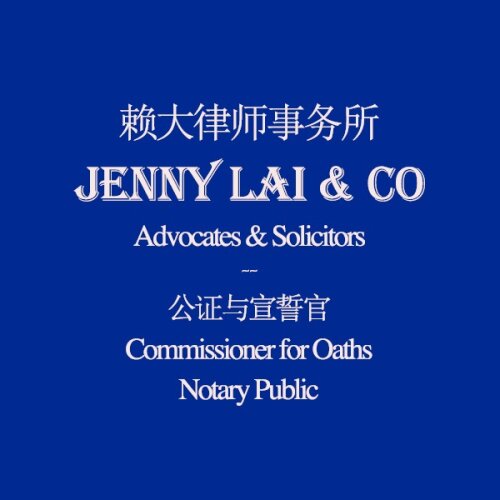Best Trusts Lawyers in Singapore
Share your needs with us, get contacted by law firms.
Free. Takes 2 min.
Or refine your search by selecting a city:
List of the best lawyers in Singapore
Singapore Trusts Legal Questions answered by Lawyers
Browse our 1 legal question about Trusts in Singapore and read the lawyer answers, or ask your own questions for free.
- deed poll
- Hi, can I check what is your quote for the deed poll for a change of name?
-
Lawyer answer by Bhavini S Law Practice
Hello. Our charges for Deed Poll is SGD 70.00.
Read full answer
About Trusts Law in Singapore
Trusts are a legal relationship where one party, the trustee, holds assets for the benefit of another party, the beneficiary. In Singapore, trusts are used for various purposes including safeguarding assets, estate planning, and managing wealth. Trusts in Singapore are primarily governed by the Trustees Act which outlines the powers and duties of trustees, and specific common law principles that apply to the administration of trusts.
Why You May Need a Lawyer
There are several reasons why individuals might need legal assistance regarding trusts in Singapore:
- Setting up a trust: Ensuring that the trust is properly constituted to avoid unintended legal and tax consequences.
- Trust administration: Managing the trust and ensuring compliance with legal obligations.
- Resolving disputes: Addressing conflicts between trustees and beneficiaries or among beneficiaries.
- Estate planning: Using trusts as a tool for structuring an estate to protect assets and reduce tax liabilities.
- Cross-border considerations: Dealing with trusts that involve foreign elements which may complicate the application of law.
Local Laws Overview
Trusts in Singapore are regulated by both statutory law and common law. The key statute is the Trustees Act, which details the appointment and discharge of trustees, the powers of trustees, and duties such as fiduciary responsibilities. Furthermore, under Singapore law, trusts can be either inter vivos (created during a person's lifetime) or testamentary (created through a will). Singapore allows for diverse types of trusts, including charitable trusts, private family trusts, and business trusts. The legal framework is designed to be flexible to serve a wide range of purposes.
Frequently Asked Questions
What is a trust?
A trust is a legal arrangement where one party, known as the trustee, holds and manages assets for the benefit of another, the beneficiary.
Why are trusts used in Singapore?
Trusts are commonly used for estate planning, asset protection, tax planning, and ensuring the proper management of assets for beneficiaries such as minors.
How do I set up a trust in Singapore?
You need to identify the assets to be put into the trust, choose trustees, and draft a trust deed outlining the terms, conditions, and purpose of the trust. It is advisable to seek legal assistance to ensure the trust complies with local laws.
What is the role of a trustee?
A trustee is responsible for managing the trust assets according to the terms of the trust deed and in the best interests of the beneficiaries.
Are there any tax implications for setting up a trust?
Yes, there can be tax implications, including income tax on trust income and potentially estate duty in cross-border situations. It's crucial to consult tax experts when setting up a trust.
Can a trust be changed once it's established?
Whether a trust can be altered depends on the type of trust and the terms outlined in the trust deed. Typically, a revocable trust can be modified, while an irrevocable trust cannot be amended easily.
What happens if a trustee breaches their duty?
If a trustee breaches their duty, they may be liable for any loss or damage caused to the trust beneficiaries and may be removed from their position.
How are disputes over trusts resolved?
Trust disputes can be resolved through negotiation, mediation, arbitration, or litigation, depending on the complexity and nature of the dispute.
Can a non-resident set up a trust in Singapore?
Yes, non-residents can set up trusts in Singapore. However, they should consider seeking legal advice to understand cross-border legal and tax considerations.
What is a testamentary trust?
A testamentary trust is established as per the provisions in a will and only comes into effect upon the death of the settlor.
Additional Resources
Here are some resources and organizations that can provide more information and assistance regarding trusts in Singapore:
- The Law Society of Singapore: Offers a directory of qualified lawyers and information on legal resources.
- The Singapore Academy of Law: Provides information on legal developments and professional legal education.
- The Ministry of Law: Oversees the regulatory framework for legal matters in Singapore.
Next Steps
If you need legal assistance with trusts, consider taking the following steps:
- Consult with a lawyer who specializes in trust law to understand your specific needs and options.
- Gather all necessary documents and information related to your assets, family, and any existing estate planning documents.
- Consider the goals you want to achieve with the trust, such as protecting assets, planning for your beneficiaries, or tax planning.
- Look into any potential trust service providers or professionals who can assist in setting up and managing your trust.
Lawzana helps you find the best lawyers and law firms in Singapore through a curated and pre-screened list of qualified legal professionals. Our platform offers rankings and detailed profiles of attorneys and law firms, allowing you to compare based on practice areas, including Trusts, experience, and client feedback.
Each profile includes a description of the firm's areas of practice, client reviews, team members and partners, year of establishment, spoken languages, office locations, contact information, social media presence, and any published articles or resources. Most firms on our platform speak English and are experienced in both local and international legal matters.
Get a quote from top-rated law firms in Singapore — quickly, securely, and without unnecessary hassle.
Disclaimer:
The information provided on this page is for general informational purposes only and does not constitute legal advice. While we strive to ensure the accuracy and relevance of the content, legal information may change over time, and interpretations of the law can vary. You should always consult with a qualified legal professional for advice specific to your situation.
We disclaim all liability for actions taken or not taken based on the content of this page. If you believe any information is incorrect or outdated, please contact us, and we will review and update it where appropriate.
Browse trusts law firms by city in Singapore
Refine your search by selecting a city.













